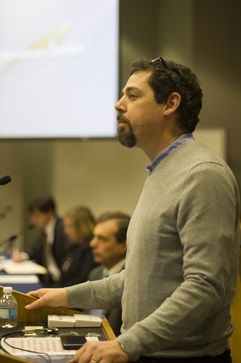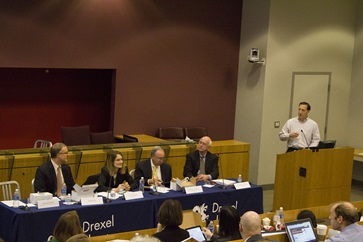With 500 million people expected to use mobile-phone-based health apps by 2015, the delivery of medical care is moving away from hospitals and clinics and into patients’ hands.
This revolution’s impact on care providers, insurers, patients, IT developers, regulators and attorneys took center stage at “Health on the Go: the Law & Business of mHealth,” a conference held on April 4 and organized by Professors Robert Field and Barry Furrow of the Health Law Program.
Apps are poised to disrupt traditional models of health care delivery by offering patients more convenience and less fragmentation between different providers and treatments, Nicolas Terry, professor of law and co-director of the William S. and Christine S. Hall Center for Law and Health at the Indiana University School of Law, said during the morning keynote.
Silicon Valley has signaled its aim to challenge traditional medicine, Terry said, noting that “Apple has been on a hiring binge,” putting bioengineers on the payroll to develop skin sensors and blood flow trackers.
With a dizzying number of mobile health apps under development, Terry said the most pressing question is whether they simply provide users with data or if they will become useful for diagnosis or treatment.
"Individual metrics in isolation are easy to measure,” he said. “When you become useful, you become regulated.”
Terry predicted that traditional medicine and mHealth developers will engage in a long “conversation” about the value and feasibility of integrating mobile health into brick and mortar operations and navigating the complexities of insurance, payments and regulation.
On a panel exploring care providers’ perspectives, Dr. Ian Bennett of the Hospital of the University of Pennsylvania said he has already seen improved communications with patients, some of whom are far easier to communicate with via text messages than any other way. Since many patients struggle to read or interpret medical information, apps must be developed in ways that can readily be understood and are sensitive to cultural differences, said Linda Fleisher, senior scientist at the Center for Injury Research and Prevention at the Children’s Hospital of Philadelphia.
Pennsylvania said he has already seen improved communications with patients, some of whom are far easier to communicate with via text messages than any other way. Since many patients struggle to read or interpret medical information, apps must be developed in ways that can readily be understood and are sensitive to cultural differences, said Linda Fleisher, senior scientist at the Center for Injury Research and Prevention at the Children’s Hospital of Philadelphia.
Insurers are hardly watching the fast-moving transformation of health care delivery from the sidelines, said Tom Olenzak, director of innovation at Independence Blue Cross.
“We’re trying to act as quarterbacks,” Olenzak said, noting the company’s involvement in developing apps that make it easier for patients to comparison shop for doctors who are both affordable and effective, that make it easier for doctors and patients to share information about medication combinations and that spur people to make healthy choices throughout the day.
More than 40,000 health-related apps have been developed so far, yet there is little research to attest to their effectiveness, said Michelle Rogers, assistant professor at Drexel’s College of Computing & Informatics, during a panel that featured the developers’ perspective. Apps have the potential to address conditions like heart disease, asthma and cancer in which there are great disparities between communities based on social and economic characteristics, Rogers said, noting that African American and Latino communities are gaining greater access to wireless networks that would make them useful.
Damien Leri, the founder and technology lead for Big Yellow Star, said apps can address health care disparities, since reducing the frequency of appointments would help those who have transportation issues or can’t take time from work to see a doctor. Leri said, however, that creating apps that are interoperable with the complex devices that exist for tracking and monitoring health functions is a major barrier for developers. Charles Sacco, the entrepreneur in residence at Drexel’s Close School of Entrepreneurship, said it’s essential that developers create apps that serve an actual need, since investors do not want to underwrite ventures that no one will actually use. Youngmoo Kim, director of Drexel’s Expressive and Creative Interaction Technologies (ExCITe) Center, said the center is working to spur development of apps by bringing together people from diverse disciplines at hackathons and sponsoring an App Lab for students.
 The move to mHealth creates huge woes for established health care institutions, said Christopher Robbins, manager of IT security for the Drexel College of Medicine, during a panel that explored legal and regulatory concerns. Mobile devices are vulnerable to weak passwords, unencrypted communications and malicious software, Robbins said, making it difficult to protect patient privacy or safeguard personal and financial records. Although hospitals are beginning to use mobile devices, few have clear policies for their implementation, said James Keller, vice president of health technology evaluation and safety at the ECRI Institute. With some of the most promising apps qualifying as “medical devices” that require regulatory oversight by the government, ECRI has established a patient safety collaboration to identify health IT problems and to share lessons learned, Keller said.
The move to mHealth creates huge woes for established health care institutions, said Christopher Robbins, manager of IT security for the Drexel College of Medicine, during a panel that explored legal and regulatory concerns. Mobile devices are vulnerable to weak passwords, unencrypted communications and malicious software, Robbins said, making it difficult to protect patient privacy or safeguard personal and financial records. Although hospitals are beginning to use mobile devices, few have clear policies for their implementation, said James Keller, vice president of health technology evaluation and safety at the ECRI Institute. With some of the most promising apps qualifying as “medical devices” that require regulatory oversight by the government, ECRI has established a patient safety collaboration to identify health IT problems and to share lessons learned, Keller said.
Apps that are categorized as medical devices face scrutiny from a gauntlet of federal agencies and some 60 government committees, said Lisa Clark, a partner at Duane Morris who represents hospitals, health systems and other providers. App developers are often unprepared for the range of legal and regulatory issues they face, Clark said, adding that some mistakenly believe that their technical genius will allow them to “define the law.”
Inventors are often ill-equipped to sell their inventions to the major companies they hope to woo as buyers, said Mitchell Goldman, a member of the adjunct faculty and a partner at Duane Morris whose clients include startup businesses.
“Developers don’t have a business model,” Goldman said, adding that they need to be educated about a host of legal and ethical matters that slow the speed with which their inventions can flower.